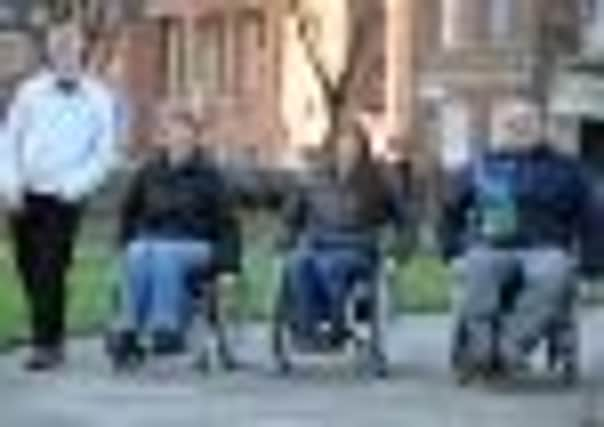Heroic effort as Paralympian meets her saviour


He was serving with Nato peace keepers in worn-torn Srebrenica was he came across the 12-year-old.
Touched by her plight, he forged a friendship with her that has lasted more than two decades.
Advertisement
Hide AdAdvertisement
Hide AdThese days, the ex-soldier turned businessman is trying to help her achieve her dream of qualifying for the Paralympics.


Ms Mujic is now 28 and in a wheelchair but nevertheless she hopes to compete for her country at javelin, shot put and discus to conquer her disability through sport.
Mr Ferguson, managing director of Ilkley company About Stone has flown Hurmija and fellow athletes Dzevad Pandzic, and Dzenita Klico, who both competed in Beijing and Damir Muratovic to Leeds.
He hopes this will help them get the very best preparation for this year’s competition as they will have access to the kind of state-of-the art gym facilities that are not available at home in Bosnia.
Advertisement
Hide AdAdvertisement
Hide AdYesterday, speaking through an interpreter, Ms Mujic said: “I am deeply grateful to everyone, it’s a dream come true to be able to come and train.”
She said if it was not for Mr Ferguson: “nothing would have been possible”.
Yesterday, when Mr Ferguson was asked if he was proud of her, he wiped tears from his eyes before smiling and saying “of course”.
He said he was drawn to help because: “The correct training facilities simply don’t exist in Bosnia”.
Advertisement
Hide AdAdvertisement
Hide AdThis isn’t the first time that Mr Ferguson has helped Ms Mujic.
Unable to leave behind the horror of the young girl he discovered in 1995 while serving as a sergeant major he launched an appeal to take her away from the horrors of the conflict going on in the Balkans at that time.
The appeal touched hearts all over the world and a year later she was airlifted to the UK where she received treatment at Oswestry orthopaedic and spinal unit that prevented her from becoming bedridden.
He still vividly recalls when he first laid eyes upon the young woman. She was sitting desolate in her hospital bed paralysed by shell fragments in her spine.
Advertisement
Hide AdAdvertisement
Hide AdHer father, two oldest brothers and four uncles were killed in the siege of Srebrenica. The death toll during the five days of terror in 1995 was put in the thousands.
“It was terrible to see a child with a completely lifeless expression,” he said.
Mr Ferguson has unofficially adopted her and now two decades later he is now putting everything into helping her realise her latest ambition.
Two of the athletes who have come over to the UK have already qualified but Ms Mujic has still to do so. She hopes the training facilities at the Virgin Active gym, will help her realise her ambition of getting to London 2012.
Advertisement
Hide AdAdvertisement
Hide AdShe qualified for the Beijing games but sadly could not compete there because of illness.
Her coach, Edib Rahmanovic, also speaking through an interpreter, said when he first met Ms Mujic she was living on the fourth floor of an apartment block. She was isolated but getting into athletics was a way to build up her strength. He said: “She is very, very determined.
“They keep saying that she is like a gladiator, she has the spirit of a gladiator.”
Her efforts are already paying off. She won three gold medals in a competition in Sarajevo at the end of last year and was named female athlete of the year at an awards ceremony in Bosnia.
Advertisement
Hide AdAdvertisement
Hide AdThe target is £30,000, of which nearly £4,000 had been raised by last Friday.
Mr Ferguson has set up a website at http://olympicdreams2012.com to encourage online contributions to the appeal and he has already spent many hours drumming up donations to help Ms Mujic and her fellow athletes.
He knows how proud he will be to see the girl he met in such desperate circumstances being given the chance to make her sporting dreams come true.
• This year the Paralympics are set to return to their city of origin.
Advertisement
Hide AdAdvertisement
Hide AdThe first top-level competition for athletes with disabilities was staged to co-incide with the 1948 Olympics in London, when Dr Ludwig Guttmann of Stoke Mandeville Hospital organised a competition for UK Second World War veterans with spinal cord injuries.
The doctor passionately believed that these individuals, with the right help and support, could lead fulfilling lives convinced that sport could play a very important role in achieving this.
Since then, the contests have steadily developed, usually taking place shortly after the Olympics, using the same arenas and facilities. This year’s events in London will feature 20 sports in 312 sessions. They start with an opening ceremony on August 29.